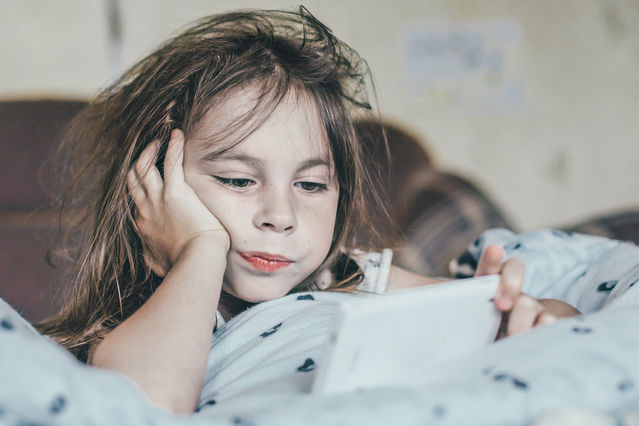Anxiety
How to Talk to Kids About the Las Vegas Shooting
The way you respond to tragic events shapes your child's core beliefs.
Posted October 2, 2017

When tragic events like the Las Vegas shooting occur, it can be hard to know what to say to your kids. After all, it doesn’t make sense why someone would do something so horrific. So how can you possibly explain it to your kids?
Many parents’ first instinct might be to avoid the subject and hope their kids don’t hear about it. And while there may be a few kids who don’t catch wind of the incident, most of them will.
Whether their classmates bring it up at school, they stumble across a news story on their digital devices, or they overhear someone talking about it in the store, most kids will learn that something terrible happened.
Your response will shape your child’s core beliefs
The conversations you have with your kids—as well as the conversations you avoid—will impact their core beliefs about themselves, other people, and the world in general.
For example, will your child decide the world is a terrifying place filled with bad people who want to hurt her? Or will she grow to believe that there are a few bad people out there, but for the most part, there are good people who are working hard to keep her safe?
Even your silence on the subject could lay the foundation for unhealthy core beliefs. When parents don’t acknowledge a tragic incident, a child might think, “My parents don’t talk about what happened because you shouldn’t talk about sad things.” Ultimately that child may think sharing sad feelings is unhealthy.
Or, a child whose parents never mention the incident might conclude, “My parents don’t think I can handle hearing about bad things.” He may grow up to believe he’s fragile and weak.
So it’s important to proactively instill healthy chore beliefs in your kids. Rather than saying, “Bad things don’t happen,” tell them, “Bad things do happen, but we’re strong enough to deal with those things.”
That doesn’t mean you should share every detail of a tragic event. Instead, it means you should carefully give your kids as much information as they can safely handle and use it as a teachable moment to build mental strength and foster resilience.
Tips for talking to kids about tragedies
You know your child best, and you’ll have a good idea of how much information your child is ready to hear. Consider these tips as a guideline:
Don't allow young children to watch the news. Watching news footage can be very disturbing to young children so it’s important to keep it off when they’re around. If a story comes on while your child is in the room calmly say, “I don’t think this is something we should watch right now,” and turn the station. If you panic, you may increase your child’s anxiety.
Keep your message simple. Say something like, "A bad person decided to hurt other people." For young children, this may be all the information they need. Older children are likely to ask more questions. It’s OK to say you don’t know all the answers.
Focus on the steps that are being taken to keep people safe. Talk about how police officers, government officials, and other first responders are helping. Spend more time talking about the good work people are doing, rather than the horrific event. This can help reduce your child's anxiety about safety.
Point out the good things everyday citizens are doing. Talk about how nice people are helping families who had a loved one who got hurt. Look for specific ways people are pitching in to help one another. This can show your child that the majority of people want to treat others with kindness and not hurt them.
Empower your kids to become helpers. Discuss how they can take positive action in the wake of a tragic event. Writing a thank you note to a police officer or donating allowance money can go a long way toward helping kids see that they can always take steps to make the world a little better. Kids who feel like they have a little bit of control are less likely to feel helpless in the wake of a tragic event.
Use caution when sharing your suspicions of political or religious motives. Even if you suspect religious or political motives, don't share those thoughts with young children. Invite teenagers to express ideas about why someone may harm others. Be willing to share your thoughts but be aware of the lasting impression you might give. You don't want to add to stereotypes your teen may already have.
Choose any words about mental illness carefully. If you say the shooter likely had a mental illness, be careful to point out that the vast majority of people with mental illnesses don't commit violent crimes. You don't want to teach your kids that people with a mental health problem are bad or should be feared.
Hold follow-up conversations. Your child may need time to process the information. He may come to you several days later with follow-up questions, or you might notice he acts out more shooting scenes in his play. Turn those things into teachable moments and opportunities to talk more about the tragedy.
Send a healthy message to your child
No matter how many conversations you hold or how much you decide to share, keep the message the same, bad things happen but there are good people out there helping and we’re strong enough to get through it.
Sending your child that message fosters resilience and teaches your kids they’re able to cope with whatever bad things come their way in life.
References
Morin A. 13 Things Mentally Strong Parents Don't Do: Raising Self-Assured Children and Training Their Brains for a Life of Happiness, Meaning, and Success. New York, NY: William Morrow, an imprint of HarperCollinsPublishers; 2017.




